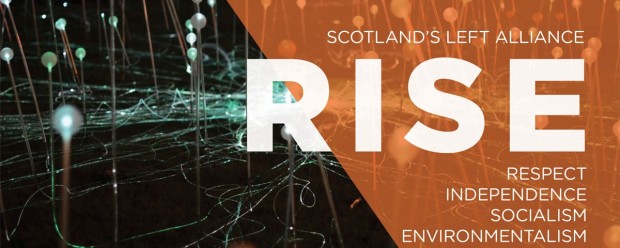The Scots Perspective interviews Democratic Left Scotland Convener and Dundee Trades Council Chair, Stuart Fairweather about the role of RISE in progressive politics and the push for independence.
As the RISE party launch occurs at the weekend, we speak to Stuart Fairweather, a veteran political activist, convener of the Democratic Left Scotland, chair of the Dundee Trades Council and member of the Dundee Radical Independence campaign. He was active in the Trade Unions for YES organisation and has been a politically active for over three decades.
Stuart spoke at the launch of RISE and was invited, as an observer, onto the steering committee integral in developing the RISE party. Classing himself as ‘not quite a convert’ we ask Stuart about how he views the role of RISE within Scottish politics and the nature of progressive politics generally in Scotland.
RISE is a relatively new phenomenon for Scottish Politics, explains Stuart, and it is not a political party in the traditional sense. There has been an ambivelançe to elections by the far-left in the past, he points out, but RISE comes from a different perspective. The YES campaign initiated an enthusiasm and engagement in canvassing and campaigning and RISE develops that enthusiasm and position it with a wider more pluralist anti-austerity alliance.
The Independence referendum has changed everything in Scotland. The parameters of political action and ideas has been increasingly articulated through the struggle for self-determination. The collapse of the Labour Party, the surge of the SNP, the coalition gathering around RISE, as well as the Scottish Greens’ commitment to independence means that any progressive politics is coalescing around independence. One of the four tenets of RISE’s policy is independence, showing its central position in left-wing politics.
Stuart agrees to a certain extent. What ‘independence actually means in the context of globalisation is debatable’, he suggests. But the ‘relationship between the momentum for a further referendum and anti-austerity politics provides a potential for challenging neo liberalism.’ For those reasons ‘instrumental independence is central to a progressive political struggle in Scotland.’
There is movement within England that shows a developing struggle of anti-austerity politics that is taking hold. Corbyn’s surprise popularity and his potential to transform the Labour Party into an oppositional force creates a new politics for England. Does this change the political situation in Scotland?
Stuart thinks this is unlikely. Regardless of the leadership election he is suspicious of the Labour Party’s ability to become progressive. ‘For too long Labour has been very comfortable with being her Majesty’s loyal opposition rather than being the spearhead for an alternative in parliament as well as wider society,’ he suggests.
Will a Corbyn victory revive the Labour Party in Scotland?
“Whilst there may be some positive association with any Corbyn victory, it is unlikely to be enough to seriously challenge the SNP. The Labour Party’s failure to back a Yes vote will long damage its position in Scotland. Any attempt to establish a credible argument for greater powers should be welcomed but in itself will not address the issue of trust. Labour put the British establishment before the people.”
Along with that sense of Labour party betrayal, Scotland is also now coming to terms with the decision it made. In opting to remain part of the UK, we are now subject to a government that is unprecedentedly right wing. The destruction of the welfare state, the persecution of the poor and vulnerable and the erosion of our civil liberties create a Union that is somewhat disconnected to Scottish politics. “The prospect of an independent Scotland is something entirely different from Britain’s apparent enthusiasm for austerity” and “creates an ongoing contradiction,” explains Stuart.
With these issues in mind then, what next for Scotland? Stuart explains that in the short term, the May 2016 elections are pivotal in that they will “act as a proxy for the next referendum.” There is a lot of certainty that there will be another referendum but when that will be is subject to much speculation. Stuart considers that conditions are more important than time frames. Ensuring the next referendum ‘can be convincingly won’ is key, but creating ‘conditions for that is the hard bit’.
Stuart notes that the central point is whether SNP will include a clear timetable for a second referendum in their Hollywood manifesto. Naming any date is dangerous but ‘finding a form of words that keeps the prospect alive and connected to anti-austerity politics is what is important’.
And RISE’s role in all this? RISE can play a role in developing the anti-austerity / independence agenda set out on Scotland. But only if they can ‘develop this space without being sectarian’. In Stuart’s opinion, RISE should push the SNP on austerity but not on the referendum. And Stuart will be urging them to support the Green’s Maggie Chapman in the North East as part of a broader progressive alliance.
Stuart understands the difficulties involved in RISE’s new position. It needs to be critical of the SNP and Greens without being sectarian, he says, and this might be difficult for some. Last September was fundamentally ‘a democratic uprising’ he explains, and that’s what people need to be reconnected with. Organisations need to reflect the democratic tendencies in their organisational structure as well as policies, he continues. If sectarianism increases, then it will repel people and damage the anti-austerity movement. After the conference, however, Stuart is hopeful that RISE can avoid the pitfalls and play a positive role in Scotland’s new progressive politics.
________________________
If you like what you read please check out some of our other articles. If you don’t like what you read please give your own perspective and contribute! As a new venture we are always looking for talented writers with something to say about Scots politics and culture. And if you have never written before, give it a try. Please contact scotsperspective@gmail.com or message our Facebook page.



